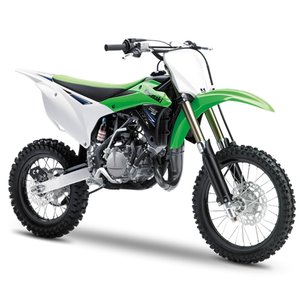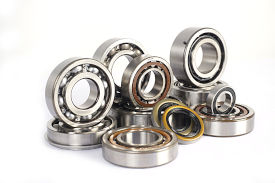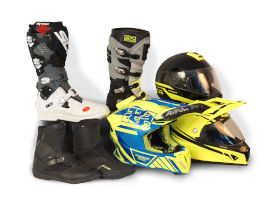Kawasaki KX 85 (2001-2013): A Legendary Two-Stroke for Aspiring Champions
For over a decade, the Kawasaki KX 85 stood as the gateway to motocross greatness for young riders. This liquid-cooled two-stroke warrior dominated the 85cc class with its razor-sharp responsiveness, race-bred chassis, and an engine character that taught generations the art of riding on the pipe. Let's dissect why this green machine remains a favorite even today.
The Heart of the Beast: Two-Stroke Glory
Swinging a leg over the KX 85 immediately reveals its purpose - the 84cc single-cylinder engine isn't here to coddle. With a bore and stroke of 48.5mm x 45.8mm (1.9" x 1.8") and a crisp 10:1 compression ratio, this isn't your backyard pit bike. The Keihin PWK28 carburetor delivers fuel with surgical precision, while the reed valve induction system ensures instant throttle response that'll have beginners white-knuckling the grips and veterans cackling with delight.
Power builds linearly until 7,500 RPM where the Pro Circuit exhaust (on later models) comes alive with that signature two-stroke scream. Kawasaki claims 28-29 HP (21 kW) at peak, but the real magic is in the powerband's shape - aggressive enough to teach clutch control, forgiving enough to prevent constant loop-outs. The 6-speed transmission features ratios so well-spaced you'll find yourself using every cog on technical tracks.
Chassis: Where Confidence is Built
The high-tensile steel perimeter frame strikes a perfect balance between rigidity for cornering and flex for bump absorption. At 1290mm (50.8") wheelbase on the KX85-II models, stability at speed is remarkable for a mini, yet the 27° rake angle keeps steering light enough for rutted corners.
Suspension specs tell the story: - 36mm inverted forks with 16-way compression damping (275mm/10.8" travel) - Uni-Trak rear shock with 4-position compression/20-position rebound adjustability
On hardpack, the front end stays planted through braking bumps. In whoops, the rear maintains composure where competitors often kick sideways. The adjustable spring preload lets riders tailor sag for everything from supercross-style jumps to endurocross obstacles.
Ergonomics: Built to Grow With
With seat heights ranging from 840-870mm (33.1-34.3"), the KX 85 accommodates riders from 150-170cm (5'-5'7") comfortably. The narrow 735mm (28.9") width makes gripping the tank effortless, while the 71kg (156.5lb) wet weight disappears beneath you once moving.
Standing riders will appreciate: - 340mm (13.4") ground clearance that glides over roots/rocks - 1910mm (75.2") overall length for stability at speed - 5.5L (1.45gal) fuel tank that lasts 45-60 minutes of hard riding
Track Performance: Teacher and Tormentor
Launching off the gate, the KX 85's power hits hard but controllably. Novices learn to modulate the clutch in the mid-range, while experts can fan the lever to keep the revs dancing near peak power. Through rhythm sections, the suspension soaks up successive hits without packing down.
The Nissin hydraulic brakes (single 184mm discs front/rear) offer progressive bite - enough to slide the rear into corners but without the wooden feel of some competitors. Tire choice matters: - 70/100-19 front and 90/100-16 rear (KX85-II) for intermediate terrain - 70/80-17 front and 90/90-14 rear options for harder surfaces
Competition: How the Green Machine Stacks Up
Yamaha YZ85
- Strengths: Softer power delivery, lower seat height (838mm/33")
- Weaknesses: Older chassis design, less adjustable suspension
- KX Edge: More progressive powerband, better stock tires
KTM 85 SX
- Strengths: 19% more peak power (34 HP), hydraulic clutch
- Weaknesses: Abrupt power hit, premium parts cost
- KX Edge: Easier maintenance, smoother transition to powerband
Husqvarna TC 85
- Strengths: Electric start option, modern ergonomics
- Weaknesses: Heavier at 74kg (163lbs), complex power valve
- KX Edge: Simpler carbureted setup, better aftermarket support
Where the KX 85 truly shines is durability. While orange bikes eat pistons and blue bikes stretch chains, the Kawasaki's chromed cylinder and robust bottom end withstand seasons of abuse with proper care.
Maintenance: Keeping the Beast Alive
Engine Care
- Premix Ratio: 32:1 for break-in, 40:1 thereafter
- Piston Replacement: Every 25-30 hours (Wiseco Pro-Lite kit recommended)
- Reed Valve Inspection: Check for chipping every 50 hours
- Cooling System: Replace coolant annually, use 60/40 distilled water/antifreeze
Suspension TLC
- Fork Oil Change: Every 40 hours (Motul 5W)
- Shock Rebuild: Annually or 100 hours
- Linkage Bearings: Grease every 15 hours (MOTOPARTS.store offers a 85-specific greasing kit)
Critical Upgrades
- Air Filter: Twin Air Dual-Stage filter with pre-oiled skins
- Sprockets: Renthal 420 chain conversion kit for longer wear
- Handguards: Acerbis X-Factor for woods riding
- Pipe Guard: P3 Carbon Fiber for roost protection
The Verdict: More Than a Stepping Stone
Thirteen years of refinement created a mini motocrosser that's both teacher and weapon. The KX 85 doesn't just make fast riders - it makes smart riders. Its predictable nature builds confidence, while the robust aftermarket (including MOTOPARTS.store's curated upgrade selection) lets it grow with a rider's skills.
For parents, it's a relief knowing used examples still command value due to legendary reliability. For mechanics, it's a dream - simple systems with abundant parts. But for riders? It's pure, unadulterated two-stroke joy that'll have them sneaking out to the garage just to stare at it.
In an era of four-stroke dominance, the KX 85 remains a testament to why we fell in love with dirt bikes - light, loud, and demanding every ounce of skill to master. Long live the two-stroke king.
Specifications sheet
| Engine | |
|---|---|
| Stroke: | Two-stroke |
| Ignition: | Digital CDI |
| Max power: | 21 kW | 28.0 hp |
| Max torque: | 18 Nm |
| Fuel system: | Keihin PWK28 carburettor |
| Max power @: | 11500 rpm |
| Displacement: | 84 ccm |
| Configuration: | Single |
| Cooling system: | Liquid |
| Compression ratio: | 10.0:1 |
| Number of cylinders: | 1 |
| Dimensions | |
|---|---|
| Wheelbase: | 1255 mm (49.4 in) |
| Dry weight: | 65 |
| Wet weight: | 69 |
| Seat height: | 840–870 mm (33.1–34.3 in) adjustable |
| Overall width: | 734 mm (28.9 in) |
| Overall height: | 1054 mm (41.5 in) |
| Overall length: | 1821 mm (71.7 in) |
| Ground clearance: | 340 mm (13.4 in) |
| Fuel tank capacity: | 5.68 L (1.50 US gal) |
| Drivetrain | |
|---|---|
| Clutch: | Wet Multi Disc |
| Final drive: | chain |
| Transmission: | 6-speed |
| Maintainance | |
|---|---|
| Break fluid: | DOT 4 |
| Spark plugs: | NGK BR9ES (inferred from common practice) |
| Fuel mixture: | Premix (40:1 ratio recommended) |
| Coolant capacity: | 0.6 |
| Chassis and Suspension | |
|---|---|
| Frame: | High-tensile steel perimeter design |
| Rear tire: | 90/100-14 |
| Front tire: | 70/100-17 |
| Rear brakes: | Single disc |
| Front brakes: | Single disc, hydraulic |
| Rear suspension: | UNI-TRAK® single-shock system, adjustable compression and rebound damping |
| Front suspension: | 36mm inverted telescopic fork, adjustable compression damping |
| Rake (fork angle): | 27.0° |
| Rear wheel travel: | 275 mm (10.8 in) |
| Front wheel travel: | 275 mm (10.8 in) |



















